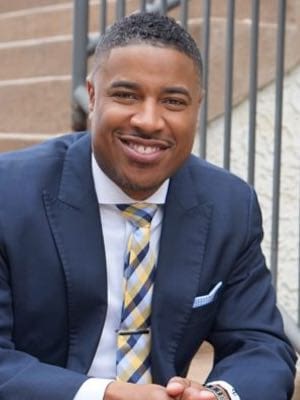Two videos have gone viral in recent months.
One from New York showed two toddlers meeting up on the street. The two little boys, one white and one black, are best friends and couldn’t wait to see each other again. When their eyes meet, they immediately give each other a big hug.
It was a heartwarming moment. Many suggested that in this age of hatred, division and bigotry, this video should inspire people to come together.
Children are innocent. They have not been contaminated by outside influences or indoctrinated with hate. So, in humanity’s most authentic and genuine way, they run and embrace one another. It’s a beautiful thing.
The other video brings us back to Sept. 6, 2018. A young man named Botham Jean is in his apartment watching television and eating ice cream when off-duty police officer Amber Guyger comes in because she believes it is her apartment and shoots Jean in his own home.
My intention is not to debate the facts of this case. Those have already been debated, and she has been found guilty in the court of law. But, one thing is clear: Jean’s life was taken for doing absolutely nothing.
This is a tough one for many people to digest because this was not a case like Walter Scott, who was running from a police officer in South Carolina and was shot in the back.
This is not a case like Philando Castile, who was pulled over for a traffic stop and less than a minute later was fighting for his life after seven shots were fired.
This is not a case like Alton Sterling, who was said to have a gun while he was selling DVDs at a convenience store. He was shot while struggling on the ground with an officer.
None of these cases passes the smell test and each represents an abuse of power and excessive force.
However, each of these was in the context of a police and civilian encounter outside of the private residence.
Botham Jean was at home in his underwear watching television. And now a life has been lost.
Those two little boys in the earlier viral video don’t know anything about this kind of stuff yet.
The little white boy is not yet familiar with a history that oppressed the little black boy’s people, has not yet been at the dinner table with family members and heard the “N-word” used in the direction of an African American, has not been introduced to the disparities that exist in this world between black and white people.
The little black boy hasn’t been called out of his name yet, has not yet been stereotyped while shopping in the mall, has not yet had to be intimidated by those assigned to protect and serve him.
So, they can hug in innocence because (praise God) they don’t have to deal with grown folks’ drama.
This second video has no innocence; it’s the direct result of a crime committed. A person who was loved and cherished has been taken away from his family due to the reckless behavior of one individual.
And yet, with all of that pain, Brandt Jean, Botham’s brother, tells the assailant who killed his brother, “I forgive you.”
“I can only speak for me. I can’t speak for anyone else in my family,” he says. “I don’t want you to rot in jail. I want you to give your life to Christ because that is what I believe my brother would want.”
He then did what most people would think was unfathomable. He asked the judge if he could give the person who killed his brother a hug.
Some were upset at the young man. How could you hug the person who killed your brother?
Others thought the young man’s gesture was an example of authentic love and forgiveness as represented in Jesus Christ. This is what we should all aim to be like.
Many Christians viewed the same incident through different lenses.
I want to deal with this on a broader level, wrestling with a greater forgiveness that is not necessarily concerned with the one who is doing the forgiving. This message is concerned with the one being forgiven.
When I heard Brandt Jean forgive Amber Guyger and give her a hug, I wasn’t bothered by him forgiving her. If he can do that, more power to him.
My only thought was about all the forgiving black people have had to do through the years, about the many people wrongfully or excessively convicted of crimes who are in prison as we speak.
All I could think about was Emmett Till, Brian Banks, the Exonerated Five, Trayvon Martin, Medgar Evers.
All I could think about was all of the times my people have been expected to forgive for the things done to them.
I’m not here to jump on people who forgive. I’m here to speak about what the forgiven folk need to do.
When a person genuinely accepts forgiveness, they are now the forgiven, which comes with responsibility.
You can’t say you’ve been forgiven and keep on doing the stuff you keep asking forgiveness for. At some point, you have to change your behavior.
It is not wrong for the forgiver to look at the forgiven and say, “At some point, you need to change.”
It’s OK for the forgiver to look at the forgiven and say, “I can’t keep allowing you to abuse me, I forgive you, and you do it all over again.”
At some point, the guardians of systemic racism, of unjust systems, of white supremacy have to repent.
You can’t look at Brandt Jean and declare he is a great Christian, without looking at Amber Guyger and saying the system that created her and perpetuates her has to change.
In Jeremiah 18, we’re presented with the image of a potter working with clay that has become marred or spoiled.
It wasn’t working as it was supposed to, wasn’t what the potter intended, and so it required starting over and reshaping the clay.
Jeremiah observes this process, and then God gives him a message to present to the nation. “O house of Israel, can I not do with you as this potter has done? Like the clay in the potter’s hand, so you are in my hand.”
There is an implication in this text that while God is sovereign and all-powerful, God will not force people to get in his hands for reshaping. Forgiveness and the offer of redemption are being freely offered, but repentance is necessary.
The people of Israel have to get to the place where they say, “I want to change. I want to do what is right. I don’t want to continue to turn my back on God. I’m ready to repent.”
When you look on television and social media, that’s why people march. That’s why people protest. That’s why people write articles. That’s why people don’t shut up.
That’s why the NAACP and the National Action Network are still relevant. That’s one of the reasons the black church still speaks loudly.
That’s why we need to be asking questions of the forgiven: If I’m going to keep on forgiving you, at what point do you act like you’ve been forgiven? At what point does the criminal justice system act like it has been forgiven? At what point do white supremacists act like they have been forgiven?
At what point does the system repent, give itself over to the potter and allow the potter to rework it, reshape it, remake it, lump it together and start all over again?
That’s how love and justice can cohabitate. That’s how forgiveness and accountability can cohabitate. That’s how mercy and righteousness can cohabitate. Greater repentance must happen!
Editor’s note: This article is a shortened version of a sermon Cory Jones preached on October 8, 2019, at Tabernacle Baptist Church in Burlington, New Jersey. It is used with permission. The full-length sermon is available on TBC’s Facebook page here.
Senior pastor of Tabernacle Baptist Church in Burlington, New Jersey. Jones serves on the Good Faith Media governing board. He holds a Bachelor of Arts Degree from the University of California, Berkeley, a Master of Divinity from the Morehouse School of Religion at the Interdenominational Theological Center, and a Doctor of Ministry from Beeson Divinity School at Samford University.


